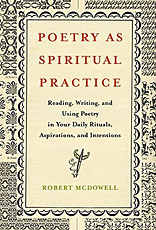"Poetry is the most honest verbal expression among any people, at any time, in any situation. It comforts and challenges reader and writer alike. Contemporary poet Allen Grossman calls poetry 'the historical enemy of human forgetfulness' and attributes to it the capacity of self-preservation. Poetry's meditative power in spiritual practice awakens you and makes you more skillful as you navigate life's rapids. It connects you to me and others. Through poetry, you also carry on the two most intimate conversations of your life — the conversation with your Supreme Being and that with yourself.
"Poetry as spiritual practice leads to stillness, the calm center where you are most open and alive. Poetry itself makes you more mindful, and as you become so, you gracefully reconnect with the natural world. Through poetry as spiritual practice, you become a more confident communicator and a more attentive, compassionate listener. Mindfully using applications of poetry can create patience and greater harmony among friends, in families and professions. As you hear or speak poetry, the particles in your brain connect and dance, creating physical sensations of lightness, darkness, joy, and sorrow. Through poetry's sound and pictures, its cadences and imagery, you achieve greater awareness and more intimate knowledge of things seen and unseen and more abundance in your spiritual life.
"Nothing creates greater understanding of poetry and intimacy with it than writing it yourself. Writing poems opens windows, doors, and opportunities. You can write in solitude — in a bedroom, a parked car, on a plane or train, in a cubicle at work, on a mountainside. You can write with a group — a spiritual community, a reading club, a writing workshop, and with friends as you hang out. Anyone who is compassionate, who yearns for deeper awareness, and who possesses the human gift of language has the innate ability to write poems."
